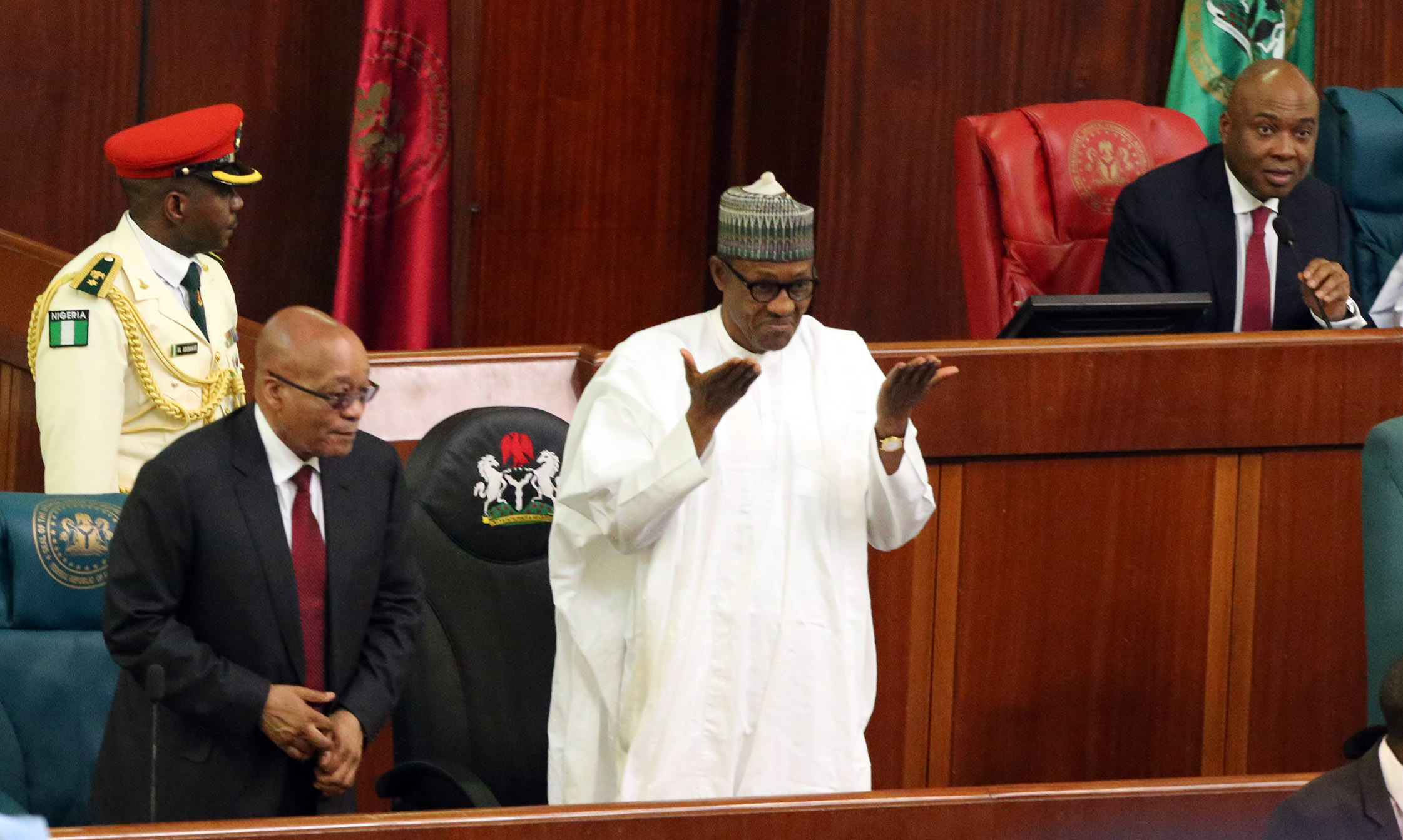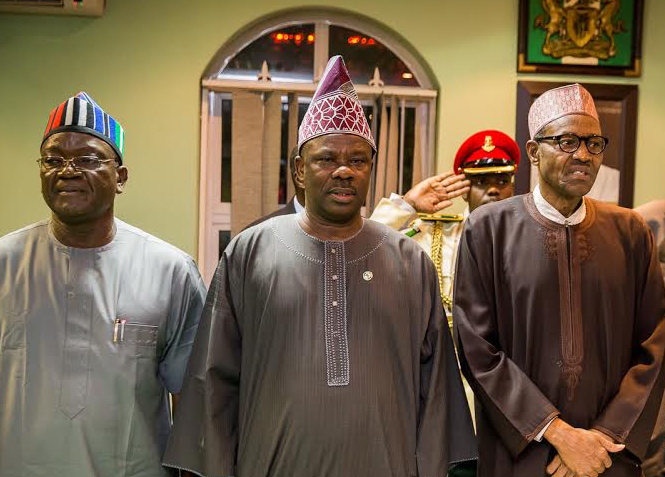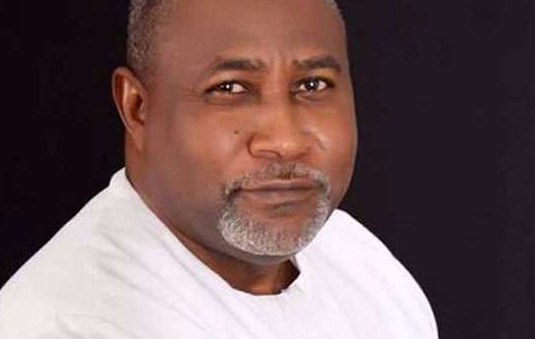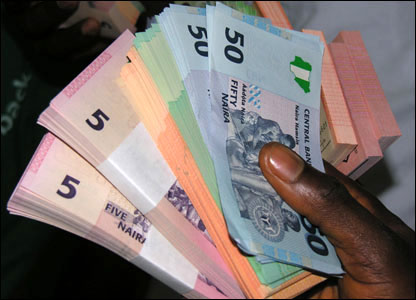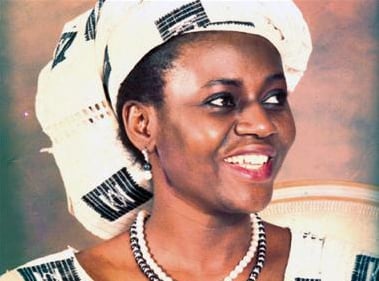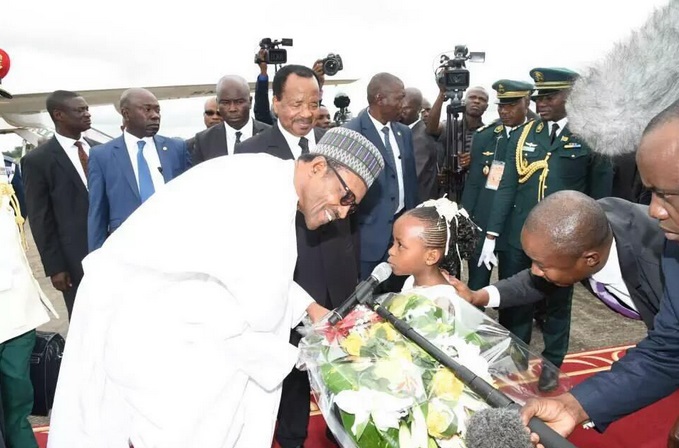President Muhammadu Buhari, President Jacob Zuma and President of the Senate Dr. Bukola Sarki as President Zuma Addresses a joint session of the National Assembly in Abuja.
There is a Yoruba saying that if you compare one child with another, you would beat the silly one to a pulp. After South Africa’s independence in 1994, two of its presidents have visited Nigeria – Nelson Mandela and Thambo Mbeki. When Jacob Zuma arrived in Abuja on Tuesday for his first state visit, he was the third and the least welcome.
Why? Zuma reminds Nigerians more of the past they’re getting away from than the present they are experiencing or the future they’re looking to. Had Zuma visited when former President Goodluck Jonathan was still in Aso Rock – Nigeria’s presidential villa – it would have been a meeting of like minds.
Just as incompetence and corruption brought Jonathan’s government to its knees, South Africa is taking a beating from an incompetent and corrupt ruling African National Congress, whose only claim to power is its past glory.
It’s hardly an inspiring example.
Advertisement
Under Jonathan the fragile ties that bind Nigeria took a blow. Not just from Boko Haram whose murderous campaign has claimed over 20,000 lives, but also from official rhetoric, which further divided the country by claiming that insurgency was a plot by Muslims to frustrate a Christian president. It’s, if you like, a benign equivalent under Zuma of the ruling party blaming whites for all of South Africa’s woes.
After surviving a second no-confidence vote in one year, Zuma must have felt that his coming was a respite of sorts from Nkandla, the corruption cases around his neck, charges of nepotism and mismanagement of Africa’s second largest economy. Already there are speculations that South Africa, a BRICS member, could be following Brazil to junk status by the end of the year.
His soul mate, Goodluck Jonathan, who famously said corruption is different from stealing, was nowhere near when he got off the plane in Abuja. Instead, President Muhammadu Buhari, who came to power about this time last year on the promise to fight corruption, Nigeria’s most deadly virus, was the one who received Zuma.
Advertisement
There was plenty to talk about. In the last five years, relations between Nigeria and South Africa have soured. Both countries backed different camps during the Ivorian crisis in 2011, with Nigeria and ECOWAS supporting Alassane Quattara, and South Africa backing Laurent Gbagbo. One year later, Nigeria and South Africa were again at daggers drawn over the chairperson of the AU commission. While Nigeria wanted Jean Ping of Gabon to have a second term, South Africa put forward its home affairs minister, Nkosazana Dlamini-Zuma, who eventually won.
On Moummar Ghadaffi’s ouster, Nigeria and South Africa took different sides, with Pretoria being more sympathetic and even offering the besieged Ghadaffi asylum.
Then there were the xenophobic attacks in Johannesburg and other parts of South Africa last April, during which Nigerian businesses were horrendously targeted forcing the government to recall the ambassador. There are members of Jonathan’s government who still believe that South Africa deliberately exposed the $9.3million black market arms cash transfer by the NSA as part of the cold war between both countries.
Then, there is economics. There are over 120 South African companies doing business in Nigeria, ranging from telecoms to hospitality and from retail and entertainment to tourism, banking and manufacturing. Only recently, the ailing South African Airways started three-day-weekly direct flights from Johannesburg to Abuja, in a move to reset its African hub.
Advertisement
A professor of political economy at the Lagos Business School, Pat Utomi, told me that, “discussions between Buhari and Zuma are vital for the new competitiveness the African Union aspires to achieve, with Johannesburg, Mauritius and Lagos in the driving seat.”
But as business between both countries goes, the hottest talking point was the fine slammed on MTN in October for failing to disconnect 5.1million undocumented subscribers. Although the fine has since been slashed by 25 percent from $5.2billion and MTN paid $250m recently after pulling out of court, Nigerian telecom authorities have insisted that the discretion for any further waiver lies solely with Buhari.
From Buhari’s statement on Wednesday, it is obvious that MTN overshadowed Zuma’s visit. For the second time in three months, Buhari hammered the telco, accusing it of criminal negligence in its handling of subscriber documentation. Yet, it seems the worst could be over for MTN, though it would live with the scar for a long time.
After what insiders confided was Buhari’s promise to “take another look” at the fine, I suspect that Zuma’s visit will produce a reprieve, which may neither be as generous as the company may wish to see nor as severe as the hawks in government would have wished for.
Advertisement
Yet, the soft issues may be the ones that define Zuma’s visit. How can ordinary citizens of both countries cut through consular red tape and get more done faster and more efficiently? How can the justice system in Nigeria and South African serve citizens better when, for example, TB Joshua happens? What can school children learn, cherish and preserve from the histories of both countries?
Nigerians adore Mandela and still remember his visit 22 years ago, not because of his economics but because he inspired hope and represented the fulfillment of a dream.
Advertisement
What will Nigerians say about Zuma years after his visit?
Road Accidents: Can We Say Enough Is Enough?
In two separate road accidents within one week, Nigeria lost a junior minister, two members of his family; and a ranking military officer. The deaths of James Ocholi, with his wife and son, followed almost immediately by the road accident, which claimed the life of the Chief of Training and Operations, Major General Yusha’u Mahmood Abubakar and left the acting General Officer Commanding 3 Division, Brigadier General MSA Aliyu badly injured, is the point where we have to say enough is enough. President Buhari’s decision to make the report of the accidents open and public is a commendable first step. I hope those splitting hairs over speed limiters will come to their senses and let the Federal Road Safety Commission do its job. Going forward, accident reports must not only be reported, recommendations for better safety standards must be enforced. Enough, is certainly enough!
Advertisement
Ishiekwene is the managing director/editor-in-chief of The Interview and member of the board of the Global Editors Network
Advertisement
Views expressed by contributors are strictly personal and not of TheCable.
Add a comment

